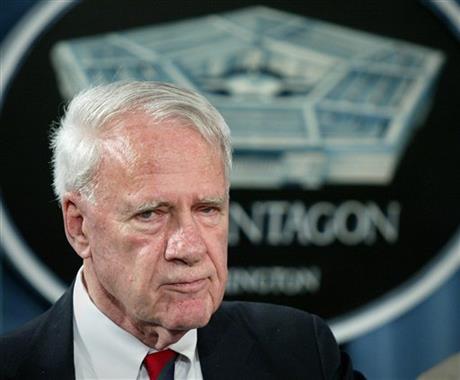WASHINGTON (AP) — James R. Schlesinger, a hawkish and erudite Republican who straddled the partisan divide to serve in Cabinet-level posts under three presidents, has died, a Washington think tank said Thursday. He was 85.

The Center for Strategic and International Studies, where Schlesinger was a trustee, confirmed his death.
The onetime University of Virginia economics professor built an impressive national-security resume as defense secretary for Republican presidents Richard Nixon and Gerald Ford and was the nation’s first energy secretary under Democratic President Jimmy Carter. Earlier he was a top White House budget official, chairman of the Atomic Energy Commission and director of the Central Intelligence Agency — all under Nixon.
In later years, he served on a host of defense and energy-related task-forces and advisory committees and continued to push for more sophisticated nuclear weapons systems. He was a longtime member of the Pentagon’s Defense Policy Board and was appointed by President George W. Bush to the Homeland Security Advisory Committee.
Schlesinger was a remarkable public servant, said former Sen. Sam Nunn, D-Ga., who sparred with him as chairman of the Senate Armed Services Committee.
He left an astounding mark on American security and energy policy, CSIS said on its website. After leaving government, Dr. Schlesinger continued to promote a stronger and more prosperous country through his work at many policy institutions, including CSIS.
The Harvard-educated Schlesinger gained a reputation as a perceptive thinker on nuclear strategy, advocating a retreat from reliance on mutually assured destruction as a means of avoiding nuclear war with the Soviet Union. Deterrence is not a substitute for defense, he said.
Becoming defense secretary in 1973 at age 44, Schlesinger was well-liked among military leaders, consulting with them frequently and aggressively lobbying Congress for more money for the armed forces. His pro-interventionist foreign policy also brought him favor with the new-right coalition of the day. He worked to rebuild military morale and revamp nuclear strategy in the turbulent period after the Vietnam War era. He opposed amnesty for draft resisters.
But his bluntness and tenacity in military budget struggles made for often prickly relations with Congress and he clashed frequently with Secretary of State Henry Kissinger. President Ford fired him in 1975 and replaced him with his White House chief of staff, Donald Rumsfeld.
Schlesinger has been extremely ruthless and irritating, Kissinger confided to James Reston of The New York Times shortly thereafter. I think the president just decided he had had enough.
But Schlesinger wasn’t gone for long.
He was back in the senior ranks of government roughly two years later, serving first as Carter’s energy czar and then as the first secretary of the new Energy Department, created amid severe fuel shortages and soaring prices spawned by oil embargoes and tensions with Iran in the 1970s.
Schlesinger easily made the transition from national security posts to overseeing energy policy, seeing many similarities and supplying Carter with the phrase moral equivalent of war for describing the national energy emergency.
That gave him some grief. The phrase became abused later on, was misunderstood, Schlesinger said later. The Wall Street Journal referred to it as MEOW and that caught on.
The pipe-smoking, sardonic Schlesinger sometimes exasperated his congressional critics, who viewed his frequent and often-lengthy congressional testimony as lecturing. He often drew criticism from Democratic and Republican lawmakers alike as he labored on the sidelines for months in nudging along Carter’s multi-faceted energy program.
A House-Senate conference committee negotiating a natural gas pricing compromise proved particularly tedious to him. I understand what hell is, Schlesinger said then. Hell is endless and eternal sessions of the natural-gas conference.
But, with Schlesinger’s help, Carter finally got most of his big energy program through the Democratic-controlled Congress, including strict new conservation standards, a since-expired tax surcharge on gas-guzzler autos and gradual oil and natural gas price deregulation.
In 1979, Schlesinger was abruptly replaced by Carter as part of a broader Cabinet shakeup.
I told Jim Schlesinger it was time for him to step down, since he had submitted his resignation on two previous occasions, Carter wrote in his White House diary, which he published years later. I offered him a major diplomatic post, but he said he couldn’t take seven children overseas. We parted company in a very friendly spirit.
Carter eventually regretted his forced exodus of multiple Cabinet members, calling it a mistake on his part that damaged his reputation for competence and weakened the authority of those who remained.
Schlesinger was never one to mince words. He said he liked Carter personally, but felt he was just not a natural leader.
He had a way of discerning things that needed to be done, and yet he was a poor leader in that he did not know the arts of keeping the public with him, Schlesinger said in a 1984 interview with the University of Virginia’s Miller Center presidential oral history project.
At the Pentagon, Schlesinger strove to keep the United States from falling behind the Soviet Union in conventional and nuclear forces. He promoted a nuclear strategy that called for precision in hitting military targets without causing huge losses of civilian life and outlined the importance of maintaining forces capable of surviving and responding to nuclear attack.
Pentagon-watchers saw Schlesinger as the rare defense secretary who put a priority on long-range strategic thinking.
Incisive, brilliant, thoughtful, said Andrew Krepinevich, of the Center for Strategic and Budgetary Assessments. But he said Schlesinger had little patience for people who can’t keep up with him intellectually.
While at the CIA in 1973, Schlesinger was angered to learn that the spy agency had provided support to ex-CIA agents E. Howard Hunt and James McCord, who were convicted of burglary in the Watergate break-in. He ordered all senior operating officials of this agency to report to me immediately on any activities … outside the legislative charter that barred the CIA from spying inside the United States.
The result was 693 pages of memos about spying on Americans, opening their mail and plotting to kill foreign leaders — made public in 2007.
Also, at Schlesinger’s direction, a new highway exit sign publicly identifying CIA headquarters for the first time was hung outside its sprawling suburban Langley, Va., campus across the Potomac River from Washington. Previously, the complex had been disguised — not very convincingly — as a federal highway-research agency.
In his earlier stint at the Atomic Energy Commission, Schlesinger brought his wife and two of his daughters to Amchitka Island in the Aleutians to witness a 1971 nuclear-bomb test and prove to critics that it could be carried out without harm to people or the environment.
James Rodney Schlesinger was born in 1929, in New York City. He graduated with a bachelor’s, master’s and Ph.D. degrees in economics from Harvard.
From 1955 to 1963, he taught economics at the University of Virginia and in 1960 published The Political Economy of National Security, a study of the economics of foreign policy. The Rand Corp. think tank hired him and later he became director of its strategic studies.
Schlesinger traveled through western Europe, Africa and Asia in 1950-51 on a fellowship. Some years later, he said, I learned that the world was a very complicated place and that the narrow discipline of economics gave a narrow insight into the social life of man.
In recent years, he served as chairman of the board of the Mitre Corporation, a nonprofit defense contractor that operates federally funded defense research and development centers. He also was a counselor to the Center for Strategic and International Studies, a Washington policy institute.
He was also a senior adviser to Lehman Brothers until the giant U.S. investment bank collapsed in September 2008, an early casualty of the Great Recession.
In 2008, Defense Secretary Robert Gates picked Schlesinger to lead a task force that made recommendations on improvements in the handling of nuclear weapons. In 2009, he joined six other former CIA directors in asking President Barack Obama to end the Justice Department’s criminal probe into the harsh interrogations of terror suspects during the Bush administration.
His wife, born Rachel Mellinger, died of cancer in 1995. She was a concert violinist and board member of the Arlington (Va.) Symphony. They had eight children.
___
Associated Press reporter Matt Daly contributed to this story.





